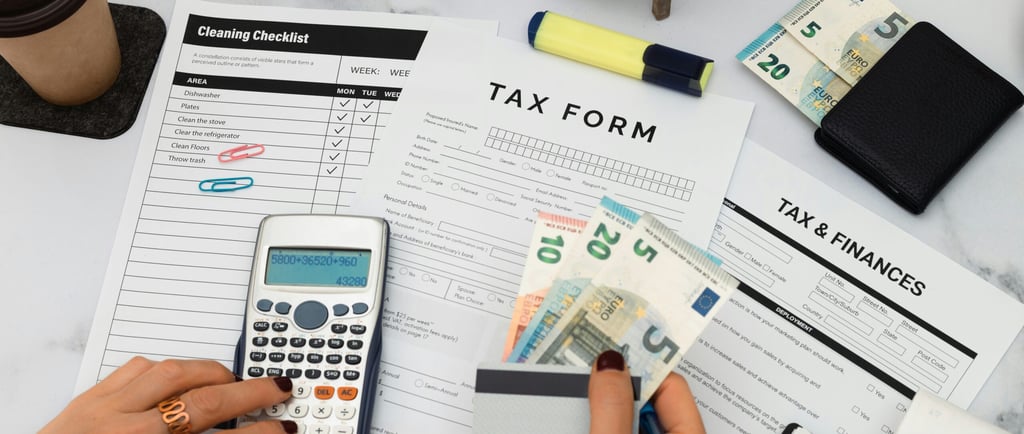Real Case: Freelancer Reduces Taxes with Smart Planning
Discover how a freelancer successfully reduces taxes with smart planning. Learn practical tips for freelancers to minimize tax liabilities and maximize savings.
10/2/20253 min read


As a freelancer, one of the biggest challenges is managing taxes. With no employer withholding taxes from your paychecks, it’s up to you to keep track of your income and expenses and plan ahead to avoid tax surprises. But with smart planning and the right strategies, you can significantly reduce your tax liabilities and keep more of your hard-earned money.
In this article, we’ll dive into a real case study of a freelancer who successfully reduced their taxes through strategic planning and smart financial moves.
The Freelancer's Journey: A Real Case
Meet Sarah, a freelance graphic designer based in Toronto. She’s been running her business for over five years and has learned the ins and outs of managing her finances. However, like many freelancers, Sarah struggled with paying high taxes due to inconsistent income and lack of a structured tax-saving plan. Here's how she turned it around.
1. Separating Personal and Business Finances
One of the first steps Sarah took was separating her personal and business finances. As a freelancer, it’s crucial to keep track of business expenses and income separately from personal finances. Sarah opened a dedicated business account to keep her income and expenses organized. This allowed her to easily track her business transactions and claim expenses during tax season.
Tax Tip: Separating your finances not only helps you stay organized but also ensures that you’re claiming the correct deductions and avoiding tax mistakes.
2. Tracking Business Expenses for Tax Deductions
Sarah knew that tracking her business expenses was key to reducing her taxable income. As a graphic designer, she had several business-related expenses, including:
Software subscriptions (e.g., Adobe Creative Suite)
Computer and office equipment
Internet and phone bills
Marketing and advertising costs
By keeping detailed records of these expenses, Sarah could claim deductions that directly reduced her taxable income.
Tax Tip: Common freelancer expenses like equipment, software, and even home office space can be deducted, lowering the amount you owe to the government.
3. Maximizing Tax Deductions with the Home Office
Since Sarah worked from home, she was eligible to claim a portion of her home expenses as business expenses. This included:
Rent or mortgage interest
Utilities
Property taxes
Home insurance
Sarah calculated the percentage of her home that was used for her business and claimed that portion of her home expenses as tax deductions. This helped her significantly reduce her tax burden.
Tax Tip: Freelancers who work from home can claim home office deductions, which can include part of your rent, utilities, and other home-related costs.
4. Contributing to a Retirement Savings Plan
Sarah also took advantage of the tax benefits offered by contributing to a Registered Retirement Savings Plan (RRSP). By contributing to her RRSP, Sarah was able to reduce her taxable income for the year. This not only helped her save for the future but also lowered the amount of taxes she owed.
Tax Tip: Contributing to retirement savings plans like RRSPs can help reduce your taxable income and ensure you’re saving for the future.
5. Setting Aside Money for Taxes
Freelancers often face large tax bills because taxes aren’t withheld from their payments. Sarah made it a habit to set aside 25-30% of her income each month to cover her taxes. This helped her avoid the panic that comes with a large tax bill in April and allowed her to make estimated tax payments throughout the year.
Tax Tip: Set aside a portion of your income for taxes every month to avoid a surprise bill at the end of the year. You can also make quarterly tax payments to spread out your liability.
6. Consulting a Tax Professional
Although Sarah was able to save money through her efforts, she also consulted with a tax professional to ensure she wasn’t missing out on any tax-saving opportunities. A professional accountant helped Sarah understand the complexities of tax deductions for freelancers and provided guidance on tax-saving strategies that she hadn’t considered.
Tax Tip: Consulting with a tax professional can help you navigate complex tax laws and make sure you’re taking full advantage of available deductions.
Results of Smart Tax Planning
By implementing these strategies, Sarah was able to reduce her tax liability by 20% in one year. She was no longer overwhelmed by her tax situation and felt confident about managing her business finances.
Additionally, Sarah learned that with proper planning, freelancers can avoid the stress of last-minute tax filing and maximize their tax deductions throughout the year.
Conclusion: Smart Tax Planning Can Save Freelancers Money
As Sarah’s story shows, reducing your taxes as a freelancer isn’t just about tracking income and expenses. It’s about creating a structured plan that includes tax-saving strategies like separating finances, claiming business expenses, contributing to retirement savings, and setting aside money for taxes.
By being proactive and seeking professional advice, freelancers can significantly reduce their tax liabilities, allowing them to focus on what they do best – running their business.
Are you a freelancer looking to optimize your tax planning? Visit Tikitax for expert advice on bookkeeping and tax strategies that can help you save money and grow your business.
TiKi Tax
© 2025. All rights reserved.
